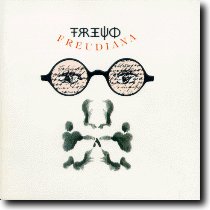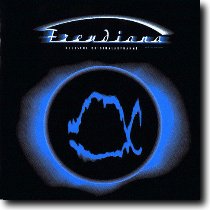Eric, a young man, goes with his travelling
companions and visits Freud's Londoner Museum. Nobody, not even the museum
directress, feels like occupying themselves with Freudiana - that is, with
Freud's items and cases - ten minutes before the museum closes. But at
this point they have already paid!
The visit gets done in a great haste in order
that the museum may be closed, but Eric is left behind. After vain attempts
to free itself, his phantasy, goaded by Freud's famous couch, recalls
images where past and present mix.
The floor swings, the museum seems to fade
away, the collection of antiques seen by Eric on Freud's desk comes alive.
A nursemaid pushes a pram. Eric's questions lead him deeper and deeper
into an oneiric labyrinth.
Eric's travelling companions meet him again
and notice that he's changed: five cases, which Freud analysed, obtain
new life in Eric's oneiric meetings (artists appear from every side). The
Circus Directress announces the actors:
- Little Hans, a five-year-old-child, suffered
from zoophobia. He couldn't leave his own house for he was scared that
a horse might bite him. This phobia was probably caused by the fact that
Hans saw his parents while they were making love.
- The Ratman, a young Russian noble, suffered
from depression. He saw white wolves on a walnut tree in his always recurrent
dream. This nightmare was due to an event which happened when he was still
a new-born baby.
- The Ratman imagines that his father and a
lady, whom his father loved very much, are made eat by big rats (that's
an oriental torture).
- The Judge, a forty-two-year-old-man, who is
successfull and very much in the public eye, actually grew up under the
thumb of a "mad system" based on the fear of being persecuted.
This "mad system" is ruled by his relations
with God and by the transformation of the Judge into a woman who will redeem
the world.
- Dora, a young woman, fell into hysteria after
her love relationship with a family's friend and that between her
father and the family's friend wife became unbearable. The doctor tried
to help Dora, but she interrupted the treatment after a few months.
Professor Clown explains to Eric that he can't
be only a passive spectator at the Circus of the interpretations of dreams
and of terrorizing phantasies. Besides, Professor Clown also tells him
that everything he sees is as if it were reflected by a mirror. The characters
that are presented at the circus tell Eric about their personal experiences
concerning psychiatric treatments.
Eric, led by Dora in the role of the Professor,
would like to help her, but he's forced to answer that he can't do that,
for he also needs help. And so Dora disappears.
Eric finds himself in a Night-club and discovers
his father between the arms of an entraîneuse. Besides, he refuses
to recognize his mother in the guise of the Night-club singer.
The Night-club proves to be a hospital where
Eric, who is wearing a straitjacket, is hypnotised just as all the other
patients are. Doctor Charcot lets Dora appear by magic, but she runs
away immediately, scared. Eric isn't able to follow her.
During an Intermezzo, Madam Butterfly tells
that she's tried some things: from the Baghwan to the Yoga. What does remain
to be tried by her?
Waiting room: only a thin cloud of cigar smoke
springs from professor's room. The Wednesday Society begins to vanish,
one fights with the overcoats. A postman has just delivered a parcel to
the "Analysts Association": the sender is Doctor Charcot from Paris; the
content is a patient whose name is Eric. He'd like to know something more
about himself. But one needs a ring to be accepted in the small circle
of Freud.
The Wolfman, the Ratman and the Judge emerge
again. They assert that they've never been in Paris. Dora appears in the
end under manifold shapes, so that Eric isn't able to recognize the right
one. She calls him and urges him not to let the moment pass in which they
can see each other.
Being back from Paris and Wien, Eric is in
London again: an underground train stops at Baker Street Station (which
is Sherlock Holmes's address). Many passengers get off the train and pass
by Eric, who believes that he recognizes Dora everywhere he turns his eyes.
Only one person remains in the opposite, empty
platform. He is easily recognizable by his clothes: it's Sherlock Holmes
whose painstaking and persevering inquiries allow Eric to know himself.
And so Eric begins to consider himself and his father relationship as a
psychiatric case. Therefore he decides to enter the Tunnel of Childhood.
Eric is battered by mental associations, day-dreams
and memories until he finds himself in the Oedipus-triangle between his
father and his mother. Eric frees himself from the omnipotent father image
thanks to a symbolic, ritual murder.
What happened during the night vanishes in
the dawn of the morning sky. A person of the travel group is absent on
the gangway of an airport: Eric. Before the airplane leaves, Eric is taken
there. Kate scolds him, but this time Eric doesn't want to retire into
his own shell. When Dora gets into the airplane, Eric understands that
she is the woman of his dreams and at last he can speak to her: "Sooner
or later, we'll see each other again!"
"Well my son, life is like a beanstalk, isn't it?"
(Keith Reid)

